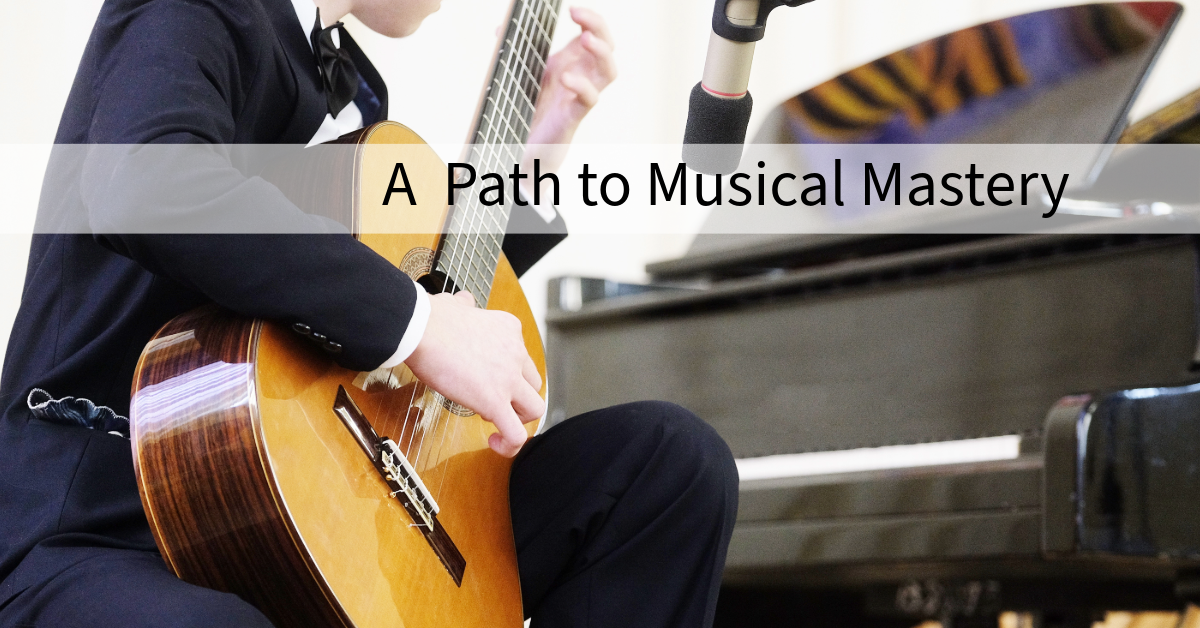Are you thinking of starting classical guitar lessons in Dubai? You are at the right place.
First we will talk about what makes the classical guitar so different and what you need to begin with. Next, why this instrument is so serious, and why the journey is so rewarding.
Why Classical Guitar Deserves Your Respect?
When people think of guitar, they usually imagine a guitarist in a rock band. Or, a cool guy strumming chords while singing a joyful song around the camp fire or in a party. The classical guitar is totally different. It’s not a casual hobby although it can be, but it is a serious and deep art indeed.
People often misunderstand the Classical Guitar. It’s not about playing popular songs; fingerstyle covers or competing to be the “best guitarist”. The Classical Guitar is a formal musical discipline with centuries of tradition. It’s as complex as learning piano or violin. In Classical guitar the focus is on the quality of the tone, musical expression knowledge of musical eras and styles. Not speed and show off.
What You Need to Start Classical Guitar lessons in Dubai?
Here is a short list of what you will need:
1. A Proper Classical Guitar
You need a proper classical guitar. In Dubai, you can purchase one at Sadek Music. As well as at Thompsun Music. If you are not sure and you not feel comfortable or you don’t know what to look for wile buying guitar- contact me and book a free trial lesson with me. A part of the trial lesson is to talk about the classical guitar and what model may sweet you.
2. A Qualified Teacher or online Course
To learn classical guitar in a proper fashion you need to have a qualified teacher that can guide you. Not only a teacher that will teach you from the very beginning step by step but also a teacher that will be there for you. Having a teacher is essential. Alternatively, you can enroll in an online guitar course. This provides proper guided learning, which is just oposite of doing it entirely by yourself.
You can start guitar lessons with me by contacting me here or enrolling in one of my online guitar courses.
3. Learn to Read Standard Music Notation
Why do you need to know the music notation?
The answer is: Because the classical guitar is an interpretational instrument,
Furthermore, we perform music written by others. As a performers, our duty is to represent the music as close to the original as possible. In fact, the modern musical notation gives us the chance to perform the music as the composer intended. We can do with great accuracy provided, we know how to read music and not only. Moreover, We need to be aware of the era in which the composer lived. That gives us a lot of information about the style and the aesthetics of that time. Also about the philosophical thoughts of the time etc.
It is your guitar teacher’s job to teach you how to read standard music notation.
If you find that in your lessons or in your child’s lessons the teacher is not using musical notation. Instead they are using TABs or “copycat” methods. Consider changing them. That is not how the professional teachers teach classical guitar and any other guitar for that mater.
4. Patience and Discipline
Here most beginners feel disappointment and discouragement. Unfortunately there are no shortcuts, just accept that without a doubt the progress is slow. On one hand It takes time to master the instrument and its technical specifics. On the other hand, the music as an academic discipline with its complexity. Each step that you take brings you up toward your musical perfection and artistic mastery. Do not neglect any part of the guitar lessons.
The Classical Guitar Mindset
What is the classical guitar mindset? We do not compete in terms of race or to show of who is the fastest and the coolest guitarist. It is all about the tone quality, discovering the micro cosmos of the sound colors. And the endless resources that the guitar can give us as means to express the music. Self-discipline and control. Noble and restrict attitude towards the music and the instrument, and respect to the generations of musicians before us.
Studying the past and appreciating the present. A classical guitarist is mastering the instrument to appreciate the music. If you are looking for fast tricks and wonders this may not be the path for you. But if you are looking to master the craft and the artistry of the music traditions. Which goes centuries deep in the past and implement it in today’s world. The classical guitar is a lifetime rewarding asset for you.
Classical guitar Lessons Dubai – an endless Musical Journey
As you improve as a guitarist and a musician, you will experience a great transformation. Namely, you will discover with surprise – How much more is there to know. Also how much is there to listen, experience, learn and feel. Not only about the guitar itself but about the music in general. You will find yourself in an ocean of knowledge and beauty that you never saw before. Certainly, the connection between your hands and the instrument will start to feel real. Additionally, you will become more open to comprehending and appreciating the music in all its shapes.
Let’s Start Your Classical Guitar Lessons in Dubai Today
If you are ready to take classical guitar lessons in Dubai? To make the guitar a part of your daily activities. As a path to discovering the amazing world of music without shortcuts.
Contact me today to arrange your free trial guitar lesson life in Dubai or online on Zoom

Leave a Reply